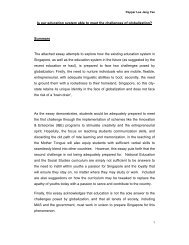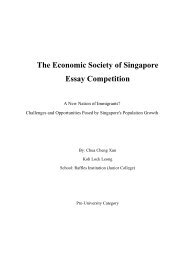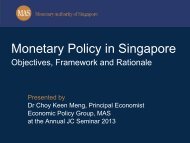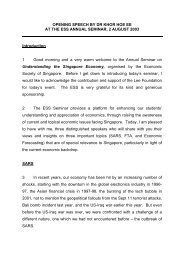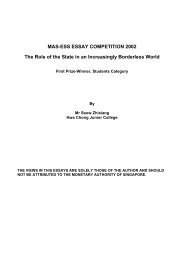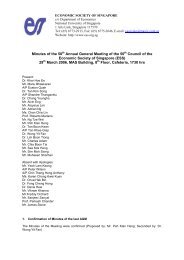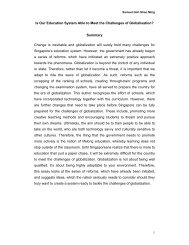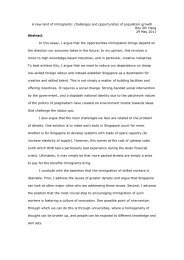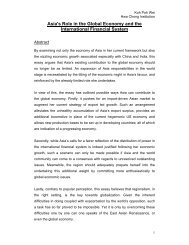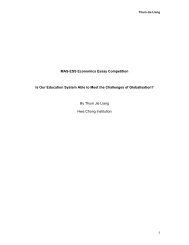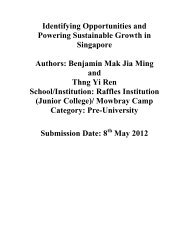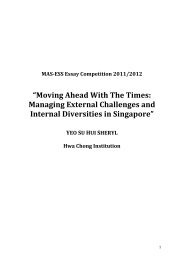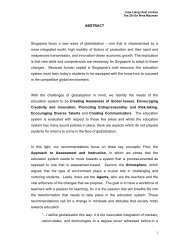Benjamin Mak and Thng Yi Ren - Economic Society of Singapore
Benjamin Mak and Thng Yi Ren - Economic Society of Singapore
Benjamin Mak and Thng Yi Ren - Economic Society of Singapore
- No tags were found...
Create successful ePaper yourself
Turn your PDF publications into a flip-book with our unique Google optimized e-Paper software.
Strategies for the long run<br />
Perhaps the fact that Mr Tharman Shanmugaratnam now coordinates both economic <strong>and</strong> social<br />
policies highlights the dualist approach needed to exploit the opportunities <strong>and</strong> arrest the challenges<br />
<strong>of</strong> immigration.<br />
Having shown how <strong>Singapore</strong> has largely succeeded in exploiting the opportunities created by<br />
immigration-led population growth, it is the challenges posed by immigrants that form the<br />
predominant concern <strong>of</strong> our suggestions. We clarify that it is not the eventual elimination <strong>of</strong><br />
immigration that is desired, but reduced dependency on immigrants to facilitate the development <strong>of</strong><br />
autonomous capacity within the <strong>Singapore</strong> economy.<br />
Blue Collar: Costlier but better<br />
Though populist measures like minimum wages may temporarily alleviate the plight <strong>of</strong> jobless<br />
<strong>Singapore</strong>ans, they sidestep the underlying problem <strong>of</strong> raising labour mobility <strong>and</strong> productivity<br />
here. Furthermore, empirical studies <strong>of</strong> Western European welfare systems show that such measures<br />
„diminish the incentives to look for jobs‟. 14<br />
Consequently, the way ahead for less-educated <strong>Singapore</strong>ans is to enhance their labour mobility <strong>and</strong><br />
productivity through schemes like the Skills Package <strong>and</strong> Upgrading for Resilience (SPUR)<br />
programme. Strong governmental support is required since „employers are not keen to provide<br />
training‟ 15 to workers which requires a huge investment <strong>of</strong> time <strong>and</strong> resources <strong>and</strong> may not be<br />
recouped if the worker moves to another firm. Such a productivity drive is necessary despite<br />
<strong>Singapore</strong>‟s success having been fuelled by total factor accumulation 16 , because our ability to<br />
generate growth from this has diminished over the long run. Indeed, some has gone so far as to argue<br />
that immigration has „put a lid on productivity gains, as manufacturers rely on cheap imported labour<br />
instead <strong>of</strong> making their businesses more efficient‟, as seen in Chart 2. 17<br />
14 See Doudejins et al (1998).<br />
15 See Chew & Chew (1995).<br />
16 See Krugman (1994).<br />
17 See Barta & Wright (2010).<br />
7



